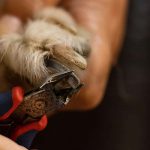Puppies are incredibly defenseless when they are born. They are born with hearing and vision impairments. Puppies keep their eyes closed for the first week or two to protect themselves from light and other stimuli. Most puppies open their eyes between 10 and 14 days; however, some puppies only open one eye at a time. For more information on a puppy’s eyes, continue reading.
When Do Puppies Open Their Eyes?
A newborn puppy will typically open its eyes between days 10 and 14, but it can take up to 21 days. Some puppies might require a little bit more time to complete this. While some puppies open both of their eyes at once, you might notice that yours opens one eye first and the other one a little while later.
Because puppies’ eyes are extremely sensitive to light and keeping them closed helps protect them, puppies are born with their eyes closed. When the nerves in your puppy’s eyes are ready to open, you’ll notice a sudden shift in the dog’s body language as they start to explore its surroundings.
Remember that not all puppies will open their eyes within the first 14 days. If your puppy’s eyes haven’t opened after more than 14 days, you might want to take them to the veterinarian.
Read More: When Do Puppies’ Ears Open?
How Do A Puppy’s Eyes Develop?
When your dog is born, you might notice that its eyes are closed. So when do newborn puppies open their eyes, and what changes do they go through as they grow? An overview of some crucial phases in a puppy’s eye development is provided below:
- 0-2 Weeks: To shield them from light during the first two weeks of life, your puppy’s eyes are closed. Puppies’ eyes will start to open as the nerves in their eyes start to become less sensitive to light.
- 2-6 Weeks: Your puppy’s eyes should be open or just beginning to open by the time it is about two weeks old. After several weeks of waiting, you should call your veterinarian if your puppy still hasn’t opened its eyes.
- 6-8 Weeks: Your puppy’s eyes and vision keep developing as it grows. You might find that your puppy still struggles with depth perception and other fundamental aspects of their vision even when they are 6–8 weeks old.
- 8 Weeks: Your puppy’s eyes should be fully formed and able to see well by the time they are 8 weeks old, at the latest. When your puppy is 8 weeks old or older and still experiencing eye issues, you may want to consult your veterinarian. Additionally, this is the time to begin crate training your dog.
Why Do Puppy’s Eyes Stay Closed For So Long?
Because their brains and eyes are still growing, the puppies’ eyes are closed immediately after birth. When a dog is born, its optic nerves and eyes do not yet have their full development, and its central nervous system is still forming.
Keeping those peepers hidden behind their lids provides much-needed protection, stops irritation from foreign objects or infections, and prevents damage that could eventually affect their eyesight. You can see why it’s crucial to avoid attempting to help them gradually open their eyes now.

What Can Puppies See?
According to Osborne, when puppies first open their eyes, the world is hazy. “They can only pick up on shapes and movement.” They can only recognize their mother and the other puppies at this stage.
Using a cotton ball carefully thrown into the air, caregivers can check the puppy’s vision by watching the puppy’s reaction. The puppy can see if she follows the hand’s motion and that of the ball as it rises and falls.
As they approach the 2-month mark, a puppy’s vision gradually gets sharper, but during this transitional period, they are sensitive to bright light. It’s crucial to keep them out of direct sunlight in a room with low lighting.
How To Care For Newborn Puppy Eyes
Usually, a mother dog will take care of a puppy’s eyes. Check on the mother and her young several times a day to make sure they are being well-cared for. A warm, moist cloth or cotton ball can be used to gently wipe away any discharge if the mother is not present.
In order to try to safeguard the puppy’s eyes and ensure normal vision, if anything discharges or otherwise appears abnormal before or after the puppy’s eyes open, you should contact your veterinarian right away. Crusty accumulation around the eyes is the first indication that something is wrong.
Fortunately, eye issues in puppies are less frequent than those in kittens, but it’s still crucial to keep an eye on your puppy’s eyes as they grow.
Osborne asserts that keeping the environment clean for the puppies can generally eliminate eye infections caused by bacterial contamination, viral problems, and eye injuries. A mother’s current vaccinations are also beneficial.
Congenital eye defects can occur in puppies at birth. Some of these may impair their vision while others merely alter the appearance of the eye without affecting how it functions. Puppies can occasionally be born blind.
These dogs may need extra care and nurturing as puppies, but as they mature, they can lead relatively normal lives in the right home.
When To Contact Your Vet
Most of the time, puppies’ eyes open naturally on their own without any help from you or a veterinarian, but you should still keep an eye on their development as it happens. Among the things you should watch out for are:
- Under-eye swelling or bulging: this could be a sign of an infection
- discharge or pus from the eyes’ area: again, this could be a sign of an infection
- Unless they open their eyes by the time they are two weeks old. If this date passes and their eyes still aren’t open, it could be a sign of a developmental problem
Make sure to call your veterinarian right away if you see any of the aforementioned symptoms. The eyes of puppies are extremely sensitive, so receiving the right care as soon as possible can make all the difference in preventing later-life eye problems.





